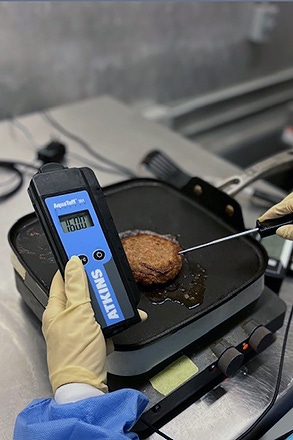Faith in safety of plant-based products is misplaced
While there have been improvements in the quality of plant-based meat, there is a shortage of data on their safety as it relates to microbial pathogens.
July 29, 2022

Meat continues to dominate on the grill, but the market for plant-based "meat alternatives" is growing. That growth is due in part to a belief that plant-based products are healthier than animal-meat and less susceptible to pathogens like E. coli, Salmonella and others.
Unfortunately, faith in the inherent safety of plant-based products is misplaced, according to scientists with the USDA Agricultural Research Service.
"Many consumers believe that plant-based foods are minimally processed, more healthful and nutritionally superior to otherwise similar animal-based counterparts," says John Luchansky, lead scientist at the ARS Eastern Regional Research Center's Food Safety and Intervention Technologies Research unit in Wyndmoor, Pennsylvania. "In reality, plant-based meats are ultra-processed and contain numerous food-grade chemicals as ingredients."
Luchansky says that consumers have been moving toward low fat/high protein foods for the past couple of decades, and the emergence of plant-based meat alternatives is an offshoot of this trend. While there have been improvements in the quality of plant-based meat, there is a shortage of data on their safety as it relates to microbial pathogens.
"Little, if any, information is available on the time and temperature combinations required to prevent the outgrowth of Shiga toxin-producing E. coli, Salmonella and Listeria during shelf life, or how to reduce these pathogens during cooking," he says.
Consumers generally, and correctly, consider meat burgers to be raw and to require cooking prior to consumption. However, many view plant-based burgers as not raw because they contain plant material, and some plants can be eaten raw.
"In reality, plants often harbor high levels of foodborne pathogens and, as such, plant-based burgers should be considered and handled just like for example, raw ground beef," says Luchansky's research partner Anna Porto-Fett, microbiologist at ERRC.
To date, there have been no recalls or illnesses attributable to plant-based protein products being contaminated with STEC or Listeria. Nevertheless, Luchansky says, plant-based products might contain these pathogens if they were processed with contaminated raw materials or in a poor-quality processing environment.
"We need further research about how to inhibit and/or destroy pathogenic bacteria and to better protect consumers against foodborne diseases," he says.
Porto-Fett notes that consumers can lower their risk of becoming ill by handling plant-based products the same way they'd handle raw and cooked meat. In general, don't cross-contaminate raw and cooked foods via dirty countertops, utensils or cutting boards. Porto-Fett says that cooking 'real' or plant-based burgers to an internal temperature of 160º F will lower the risk of food poisoning.
"If you follow the 'Four C's of Food Safety,' which are cook (160º F), clean, don't cross-contaminate, and chill, you can appreciably lower – but not eliminate – your risk of foodborne illness," she says.
"A couple of years ago, we developed a media campaign, '160º is Good,'" Luchansky says. "Basically, regardless of the protein source, you should cook your burger patty until it reaches an internal temperature of 160ºF as measured with a digital thermometer."
Source: USDA Agriculture Research Service, which is solely responsible for the information provided, and wholly owns the information. Informa Business Media and all its subsidiaries are not responsible for any of the content contained in this information asset.
About the Author(s)
You May Also Like


.png?width=300&auto=webp&quality=80&disable=upscale)
